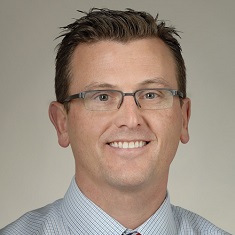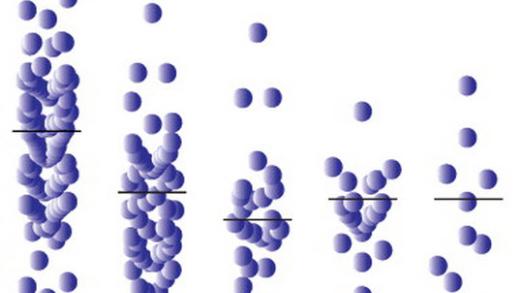
Mark Roschewski, M.D.
- Center for Cancer Research
- National Cancer Institute
- Building 10, Room 12C-442
- Bethesda, MD 20892
- 240-760-6183
- mark.roschewski@nih.gov
RESEARCH SUMMARY
Dr. Roschewski is a Senior Clinician and the Clinical Director of the Lymphoid Malignancies Branch (LYMB) of the Center for Cancer Research. His research team focuses on the management of aggressive B-cell lymphomas including diffuse large B-cell lymphoma (DLBCL), Burkitt lymphoma (BL), mantle cell lymphoma (MCL), and primary CNS lymphomas (PCNSL). Recent studies from NCI show that dose-adjusted EPOCH-R is highly effective for adults with BL and specific subtypes of DLBCL, such as primary mediastinal B-cell lymphoma. The LYMB research team also recently demonstrated that targeted agents such as ibrutinib are highly effective when combined with chemotherapy in relapsed and refractory PCNSL. Dr. Roschewski has pioneered an active translational program focused on studying clonal evolution in follicular lymphoma (FL) with an aim of identifying the molecular biology of FL patients who are failed by current therapy. The FL translational program has multiple studies for FL patients who do not yet require therapy as well as multiple treatment studies for patients in need of frontline or relapsed therapy. An important research focus of the LYMB research team involves developing non-invasive methods of monitoring disease in patients with lymphoma, including circulating tumor DNA. The LYMB research team also is dedicated to developing novel therapies for patients with rare lymphoma subtypes including EBV-associated lymphomas and lymphomas that secondarily involve the CNS.
Areas of Expertise
Information for Patients
Learn more about our clinical trials and the highly specialized care teams that lead them.

Mark Roschewski, M.D.
Clinical Trials
Research
Dr. Roschewski’s clinical research is focused on developing rational biologically based treatment combinations for patients with B-cell lymphomas. The Roschewski clinical team works closely with the laboratory operated by Lou Staudt to understand therapeutic vulnerabilities within genetic subtypes of lymphoma as well as the world-renowned hematopathologists, Elaine Jaffe, and Stefania Pittaluga, to precisely define and characterize each patient’s tumor. These tight collaborations allow for novel observations from the bench to be translated to the clinic and novel observations at the bedside to be further investigated in the lab.
A defining feature of the clinical operations in the Lymphoid Malignancies Branch (LYMB) is to focus on the treatment of lymphomas that are currently not well served by standard approaches such as high-risk subtypes of diffuse large B-cell lymphoma, Burkitt’s lymphoma, and lymphomas involving the central nervous system. Dr. Roschewski’s team is also prospectively investigating the clonal evolution of follicular lymphoma to better characterize the molecular biology of high-risk subsets. The clinical trials within the LYMB employ a strong emphasis on correlative science, including comprehensive molecular profiling of tumors and circulating tumor DNA which is an emerging biomarker that can noninvasively provide unique genomic information and may aid in clinical decision-making in the future.
Current clinical trials are testing combinations that add targeted agents such as Bruton tyrosine kinase (BTK) inhibitors to chemotherapy, including the temozolomide, etoposide, doxil, dexamethasone, ibrutinib, rituximab (TEDDI-R) for central nervous system (CNS) lymphomas and acalabrutinib with chemotherapy for diffuse large B-cell lymphoma. These trials build on observations from the Staudt lab that genetic subtypes of lymphomas are uniquely sensitive to targeted inhibitors of B cell receptor (BCR) signaling. Another regimen being developed in the LYMB is a combination of targeted agents that includes venetoclax, ibrutinib, prednisone, obinutuzumab, and revlimid (ViPOR) for patients with aggressive B-cell lymphomas, including those involving the CNS. Finally, the anti-CD47 monoclonal antibody, magrolimab, is being tested with venetoclax and obinutuzumab (VENOM) in patients with relapsed and refractory follicular lymphoma and other indolent B-cell lymphomas.
Publications
Multicenter Study of Risk-Adapted Therapy With Dose-Adjusted EPOCH-R in Adults With Untreated Burkitt Lymphoma
Inhibition of B Cell Receptor Signaling by Ibrutinib in Primary CNS Lymphoma
CD47 Blockade by Hu5F9-G4 and Rituximab in Non-Hodgkin's Lymphoma
Dose-adjusted EPOCH-R (etoposide, prednisone, vincristine, cyclophosphamide, doxorubicin, and rituximab) in untreated aggressive diffuse large B-cell lymphoma with MYC rearrangement: a prospective, multicentre, single-arm phase 2 study
Biography

Mark Roschewski, M.D.
Dr. Mark Roschewski received his B.A. from the University of Notre Dame in 1997 and his M.D. from the University of Nebraska Medical Center in Omaha in 2001. He completed internal medicine residency training while serving in the U.S. Army and completed his hematology-oncology fellowship in 2009 at Walter Reed Army Medical Center (WRAMC) in Washington, DC. He served as the Director of Hematologic Diseases at WRAMC for 3 years before joining the NIH as a Commissioned Corps officer in the United States Public Health Service in 2013. Dr. Roschewski's current role is as a Senior Clinician in the Lymphoid Malignancies Branch with a clinical research focus on the biology and management of patients with both indolent and aggressive forms of non-Hodgkin's lymphoma.
Job Vacancies
We have no open positions in our group at this time, please check back later.
To see all available positions at CCR, take a look at our Careers page. You can also subscribe to receive CCR's latest job and training opportunities in your inbox.




